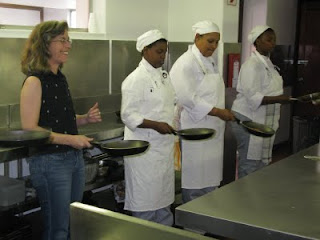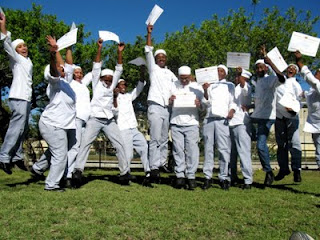
“You can see the ones who’ve been bitten,” said the middle-aged Canadian woman with the close-cropped red hair and the African-print pantsuit. “They come to Africa and never leave.”
She herself was one of the bitten: a former school principal from Ontario who’d visited Tanzania as a volunteer teacher-trainer, then met and married a man from a small village and was now living and working on local projects in Dar-es-Salaam, making $300 a month.
“I can’t believe I have a husband,” she said, shaking her head at the inexplicability of it. “I have a Tanzanian cat.”
We were on a sunset cruise on the Zambezi, staring downriver at the billowing cloud of spray from Victoria Falls, on the border between Zambia and Zimbabwe. My Beloved and I had come here for three days following a two-week visit with our friends in South Africa. The entire trip was a multisensory extravaganza from beginning to end, and I’ll write and post photos separately about the spectacular landscape, the daily adventures, and the wondrous animals—the giraffes, cheetahs, zebras, elephants, kudu, wildebeest… .
I came home with a strong urge to turn right around and fly back (after recovering from the jetlag of the 18-hour flight). I felt that I, too, had been “bitten.” And I thought about two other non-Africans who had come to the continent for one reason and ended up staying for very different ones.
*****
Our innkeeper in Livingstone, Zambia, Lynne Mendelsohn, is a lively Scotswoman who spent many years as a high-priced corporate lawyer in London and Edinburgh. Shortly before her fortieth birthday, she decided to take a yearlong sabbatical to do volunteer work in Zambia and Mozambique. When the sabbatical ended, she half-heartedly returned to her job, and discovered she no longer had the stomach for it.
She quit the firm, bought the Zig Zag B&B in Livingstone, and moved to Zambia permanently with her new Namibian husband.
The Zig Zag has the feeling of a place where NGO workers or foreign correspondents might land between assignments—small motel-like rooms of concrete floors and metal-framed four-posters with mosquito netting; beautiful gardens lush with bougainvillea; two enormous metal giraffe sculptures standing sentinel in the gravel parking lot; and the expansive bar-restaurant where guests, tourists and locals hang out at night or during an afternoon storm. The electricity predictably goes out for a few hours each day, and nothing works with the ruthless efficiency of a London law firm. Which is more than fine with Lynne.
[Your intrepid, and ghostly, correspondent, having coffee at the Zig Zag B&B.]
Besides running the Zig Zag, Lynne coordinates a community crafts collective for local women who are HIV-positive.
“THIS IS THEIR WORK!” she shouted over the noise of the ferocious afternoon rainshower thundering down on the tin roof of the Zig Zag’s restaurant-cum-front office. Lynn gestured to the racks of hand-beaded necklaces and earrings on display; all of the proceeds are returned to the local women.
Shortly after moving to Zambia, Lynn founded a UK-based charity, Life Begins, to care for and educate the children in a nearby village—too many of whom would otherwise be sent to work in the local gravel quarry at ages as young as two years old. She and her colleagues run a day-care center that feeds and cares for 100 children and 65 babies every day. Lynne collects used clothing, toys and books for the children, and on the morning we left, we handed over some t-shirts and my Disney World baseball cap in our feeble attempt to “help.”
*******
And then there’s our friend Barry Berman. A screenwriter whom we first met at a coffee bar in Los Angeles, Barry traveled to South Africa four years ago to visit a friend and kick around the country for three months. Then he met the gorgeous human whirlwind known as Megan Kruger and fell in love. He began a bi-continental relationship with Megan, and an unexpected relationship with South Africa.
With one higher degree from Ringling Brothers’ clown college, a two-decade career in Hollywood, and completely self-taught gifts as a brilliant amateur chef, Barry made the natural next career move: helping start a cooking school in a country he knew almost nothing about.
On the third day of our visit to Cape Town, we drove with Barry down a leafy residential street in the suburb of Pinelands. We passed several young people walking singly or in pairs, dressed in chefs’ whites, heading to the same place we were going: a Masonic lodge that for five days a week in eight-week sessions is home to Infinity Culinary Training, the life-changing establishment that Barry co-founded in 2009.
The three of us arrived at the school after a half-hour drive from the affluent Cape Town neighborhood of Sea Point, where gated, walled, and barbed-wired hillside homes overlook the Atlantic Ocean and Three Anchor Bay. The students, on the other hand, were walking from the train station, having arrived on third-class trains from the impoverished townships outside Cape Town, where many live in tin shacks with dirt floors, outdoor toilets and illegal wiring.
[A bathroom in the township of Phillipi, outside Cape Town. "Not much privacy," noted our guide, Khululani, wryly. Khululani, a former ICT student, is now the school's Executive Chef/Lecturer. "I am living testimony to the school's motto, 'Changing lives through cooking,'" she says.]
Seventeen years after the end of apartheid, poverty and unemployment (25% in the nation as a whole; 50% among South African youth, according to an Al Jazeera report) are what one politician recently called “ticking time bombs” in South Africa. To see this in action, you need only read Barry Bearak’s staggering article on mob violence in a Johannesburg township in last week’s New York Time Sunday Magazine.
Life is cheap and short when you have no hope. Infinity Culinary Training is about giving hope—and, more to the point, getting jobs.
The students—who do not have to pay for their own tuition (none of them could ever afford it)—are required to commit to twelve intensive weeks: eight weeks of classroom study and kitchen training, and a four-week internship. Unexcused absences are cause for dismissal from the school. Their sponsor-donated chefs’ uniforms must somehow be kept clean and white. They must work with ingredients they’ve never heard of before and that look vaguely disgusting to many of them. They learn knife skills right off the bat and within days are chopping vegetables and julienning herbs like professionals.
After eight weeks, each student is placed with a local hotel, restaurant or market for a four-week internship, after which—if they make it through and earn their final certificate from ICT—they can get fulltime jobs. It's likely they’ll start at the bottom and earn low wages (Barry doesn’t mince words about this); but most are thrilled to be working and earning any kind of salary. Many are the first in their families to have jobs in generations.
“Before I came here, all I did all day was eat and sleep and drink and do bad stuff,” said Thobani, as we sat outside on the grass with the students at the end of a school day. “I want to provide an example for my five-year-old daughter.”
[Thobani in the kitchen at ICT.]
Abongile, a 19-year-old with a four-year-old daughter, was dubious when she first heard about this school where students didn’t have to pay tuition. “I thought, ‘This man has come all the way from America just to scam us South Africans,’ ” Abongile said. But she came anyway—why not take advantage of it until the scam was revealed, she reasoned. To her surprise, Barry’s promises turned out to be for real.
“People here make empty promises. All. The. Time.” said Verna, who at 39 was one of the two oldest students in the class. Verna had previously tried to get a loan from a local bank to go back to school, and had appealed to her local district representative for help, but with no luck. I met Verna in the ladies’ room, where she was happily adjusting her new “specs.” A few days into the class session, Barry had noticed that both Verna and Abongile were having difficulty reading the board, and arranged for them to see an eye doctor and get glasses.
“Nobody does what Barry is doing—nobody,” Verna said.
Stan and I spent a day and a half at the school, watching the students study vocabulary words (“concassé,” “slurry,” and “investment” were on one day’s test); chop onions and carrots and sauté meat for the day’s lamb curry; slice potatoes thin on a microplane for a homemade potato chip garnish; and clean, clean, clean.
“Clean as you GO,” Barry’s voice would boom across the kitchen. “A-B-C: Always Be Cleaning.”
“Yes, chef,” they’d answer in unison.
[I joined the students to practice my non-existent flipping skills. There were dried red lentils in this pan when I started. By now, most were at my feet.]
Lunch is a highlight of the school day—except for Linda, who had a hard time eating because she knew her three children at home were hungry.
In the afternoons, Barry offered improvised, heartfelt motivational talks, encouraging the students to let go of the insecurities and voices that told them they weren’t good enough. He praised their hard work and demanded that they resist falling back into their old ways, even as friends back in the township tried to pull them down.
Three weeks after Stan and I got home from Africa, the students we’d met left the school and went on to their internships. Only one fell by the wayside, ditching the restaurant job after a few days because he felt he was too good to do such lowly work. The rest stuck with it, graduating from ICT four weeks later. All of them now have fulltime jobs.
Barry continues to get messages from his former students.
“The doors were opened and I had to enter,” Abongile wrote in a text message. “You were like a father to me and for that I thank you with all my heart.”
Three of the guys got together in the township and called Barry on a cellphone on Easter Sunday.
"They said they want to talk to the ANC about helping the school survive," Barry reported in an e-mail, "because 'When everybody in the locations feels what we feel, South Africa will become strong and good and loved.' "
A new class session has begun—as usual, without knowing exactly where the money will come from to see the session through. Barry has learned that one student was raped as a child. One was beaten and robbed on the way to school one day. Another is now homeless. And they keep coming to class. It gives them hope.
And I, bitten, am biding my time until we can get back to Africa.










11 comments:
I've made a few factual corrections to my original post, based on feedback from Lynne and Barry—thank you both. The photo of Thobani here comes courtesy of Barry Berman. And I was so gratified to hear from Lynne that my Disney World baseball cap is helping protect a vulnerable albino boy at the day-care center. He can be seen in this wonderful photo album: https://picasaweb.google.com/lynneinafrica/BabyFeedingProgramme.
Wonderful post. Wonderful photographs. Inspiring. Now I want to go to Africa. May Zambia and the Zig Zag, South Africa and Infinity Culinary Training, all prosper.
This is a wonderful post about the most blindingly important work. Giving people hope - I can't think of anything one could do that would be more worthwhile. All over Africa people are quietly doing amazing things. Last year I went to a benefit for a program that sends African girls to high school. A friend of mine is helping students in Guinea plant nut trees to start an export business. A very wealthy woman I met opened a school in Africa. She also helps local women sell their handicrafts -- beautiful beadwork, sandals, embroidered cloth. In many ways it's a better world than we so often think.
Just read your uplifting comment Michele. I agree: In many ways it is a better world than we often think. We hear so much about what's wrong. I am glad Susan has shared some things that are going right in a place where there is so much need.
This remarkably beautiful, thoughtful, journalistic post is exactly why I'm glad you're back. You may be bitten, but I hope you're here to stay. xo
This post reminded me how much my first trip to Africa changed my life. Thank ou for reminding me...
Mrs L
I love this post. Can't wait to read more. What an amazing trip you must have had. The idea of giving hope, I can see why people get "bitten," such a remarkable thing to discover that what we take for granted, can mean the world to someone else. I can think of nothing more fulfilling than the work being done there by your friends (old and new). I eagerly await more.
Susan, your post is so moving. Beautifully said. Thanks. More please.
A writer/film maker friend of mine has been similarly bitten. http://ateacherforgracemasak.org/about
Post a Comment